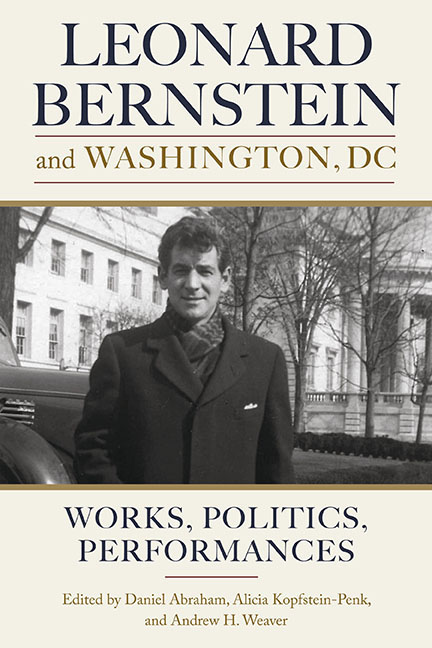10 - Political Expression and American Identity in Bernstein's 1600 Pennsylvania Avenue, Songfest, and Slava! A Political Overture
Published online by Cambridge University Press: 28 April 2020
Summary
Leonard Bernstein was an artist of strong political views, and he believed in the power of music to both express and persuade. He frequently used his compositions to communicate explicit and implicit political ideas in a number of compelling ways. One strategy found throughout Bernstein's compositional career is the presentation of political messages within the context of American national symbols or events. This approach was effective in creating a surface that was appealing to a broad segment of American society while simultaneously communicating political messages to those who were able to understand the thinly veiled symbolism. This strategy also gave Bernstein's social and political messages national specificity. In this chapter, I show how Bernstein used a variety of techniques to express various political ideas in three works from the 1970s: 1600 Pennsylvania Avenue, Songfest, and Slava! A Political Overture.
All three pieces discussed in this chapter have strong connections to Washington, DC, through dramatic representations of place, allusions to politics, location of first performances, or all of the above. The nation's capital looms large as both the carrier of and audience for the message, and the presence of Washington, DC, in these works creates an inherent element of political expression. Washington is the site of the drama in 1600 Pennsylvania Avenue, and both Songfest and Slava! A Political Overture premiered on the same program at the city's John F. Kennedy Center for the Performing Arts on October 11, 1977.
Bernstein's earlier catalog of compositions includes several works that engage with political issues. On the Town (1944) featured a multiracial cast interacting freely onstage even while it avoided overt references to contemporary racism. Candide (1956) was conceived by Bernstein and Lillian Hellman, both of whom were persecuted for their views, as political satire and an indictment of McCarthy-era politics. West Side Story (1957), Bernstein's most famous work, addresses the issues of racism and youth crime in an urban context. Mass (1971) has been considered a product of the social, political, and cultural upheavals of the 1960s. By the mid-1970s, Bernstein the composer was experienced at encoding political messages into his works, and the Watergate-era political climate seemed to call for his musical activism.
- Type
- Chapter
- Information
- Leonard Bernstein and Washington, DCWorks, Politics, Performances, pp. 237 - 266Publisher: Boydell & BrewerPrint publication year: 2020

